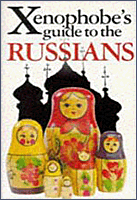






Contents:
 |
|||||
The Russians are used to being badly governed. They have been badly governed for nearly one thousand years. In their history, to date, the only alternative the Russians know to being badly governed is to have no government at all. The sheer physical size of Russia and its many constituent ethnic minorities have combined to defeat most attempts at government. When the centre is weak, local governors' rule can become arbitrary. Thus the pendulum has tended to swing between authoritarian repression and "chaos spiralling down to anarchy". One of Russia's reforming Tsarist Ministers, Count Witte, said: "The world should be surprised that we have any government in Russia, not that we have an imperfect government."
- Bureaucracy
The amount of bureaucracy in everyday life is stunning. This is because it pays. When Russia was a one-party state, there used to be a joke that they couldn't afford democracy because the one party they had cost too much already. Corruption was and is universal. Things have got worse. A party card was a passport to the good life, and was not open to any Tom, Dick or Dirty Harry. Now, anyone can play, and the stakes are high. Nothing can move without the right bumazhka or spravka (bit of official paper, chitty, bumph). There is a Russian saying: "Without a chitty, you're a worm, But with a chit: a man."
Taxes on some new enterprises are in excess of 100% which means, of course, that wherever possible the rules are evaded or bribes are offered to effect a shortcut through the jungle of red tape. The traditional solution for Western companies or individuals who wish to avoid direct collusion is to appoint a local agent who will do the necessary on their behalf. Bribes are usually offered in dollars.
The Russians have never had the right to free movement whether within their own country or abroad. You have to apply for permission to go and live in another city within Russia, and that permission is very often conditional upon being able to show that you have a job and a place to live there - a kind of Catch 22. This is one of the reasons that two or three generations of a family in Moscow squash together, all living in the one small flat. Adult children do not wish to move out even after they marry because then they might lose their right to live in Moscow itself.
Since 1992, each citizen has the right to possess a foreign passport, which for the first time in Russian history gives them the right to leave Russia any time they like. Sticklers have noticed with some surprise that the cover of many of these "new" passports still bear the hammer and sickle emblem and title of the defunct Soviet Union. "Waste not, want not" is a rule observed by bureaucrats the world over.
2009 ╘ All rights reserved. Designed by TatkaCo: tania@email.it
